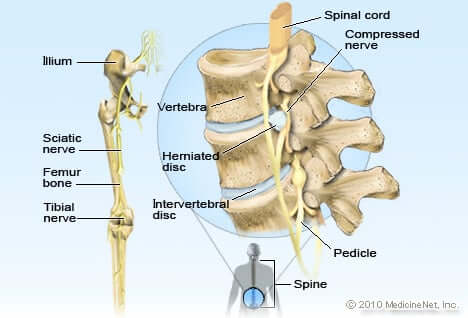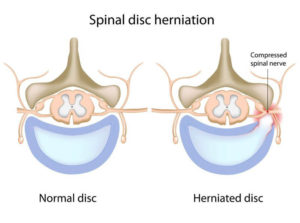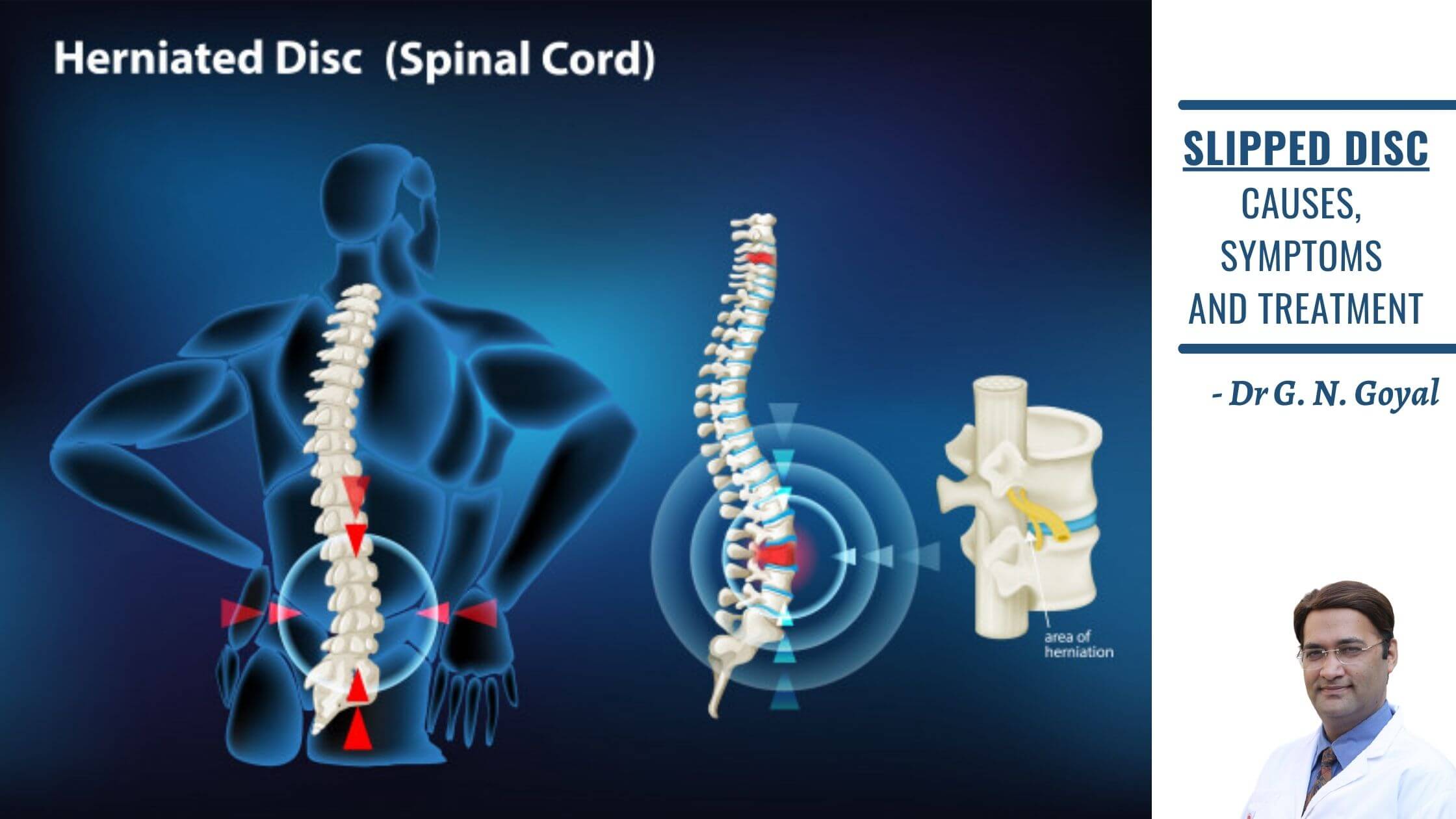SLIPPED DISC: CAUSES, SYMPTOMS AND TREATMENT
The human body is stimuli sensitive. We react immediately when we feel pain. While limb pain leaves us teary-eyed, headaches leave us sleepless. Similarly, back pain makes a person bedridden and helpless.
Back pain can be a hindrance to the daily routine of an individual. It makes you stick to your bed and holds you back from finishing assigned work and also leads to missed opportunities. It makes a person feel overwhelmed as they are unable to do basic chores.
Back pain can be caused by accidents, injuries, age, strenuous exercises, or several other reasons. A long duration of spinal pain (for over 4 weeks) can be a reason of concern. If left untreated, it can hinder an individual’s life causing grief and concern.
The human spine is made up of the spinal cord, vertebrae, discs, ligaments, and muscles. It is split into four sections- Lumbar (lower back), Sacral (tailbone area), Cervical (neck area), and Thoracic (upper and mid-back).
One of the problems which lead to spinal pain is slipped disc. With the time passing by and the advancement of the world, the stress on the mind and body of humans has been rapidly increasing. Due to this, slipped disc is now commonly heard of.
WHAT IS SLIPPED DISC?

Between each set of two vertebrae, which pile up to form a spine, there is a disc (which is like a rubbery cushion). This is known as the spinal disc.
The spinal disc is made up of a soft center (known as nucleus) which is enclosed in a tough exterior called the annulus.
When some of the nuclei seep out of the annulus, it causes a slipped disc, which is also known as a herniated disc or a ruptured disc. This can occur in any part of the spine. It can cause irritation in a nearby nerve.
Different areas or locations of the ruptured disc can result in different symptoms in the body. Although in many cases, there may be no symptoms at all, in several cases it may cause back pain, numbness, or weakness in the limbs.
Cause of Slipped Disc
It can occur because of
- age,
- accidents,
- pressure on the spine,
- vigorous activities and
- many other reasons.
HOW SLIPPED DISC OCCURS?

Just like jelly seeps out of a hole in a container, a small hole or rupture in the annulus can cause the nucleus to seep out. This may happen due to a damaged annulus, which is a result of excess strain on the back. (Annulus is the outer covering of the container)
This can cause irritation in the neighboring nerve leading to different reactions symptoms of the body depending upon the location of the slipped disc.
It can cause numbness, pain, and weakness in the arms and legs. In some cases, no symptoms are seen. It mostly does not require surgery.
SYMPTOMS OF SLIPPED DISC
The spine is a network of vessels and nerves. Since a slipped disc causes the seeped-out nucleus to cause irritation in a neighboring nerve, the nerves and muscles may have to handle the extra pressure.
This extra pressure makes the body react in a way that can be painful and unsettling for the individual who experiences it.
Different symptoms are observed varying on the basis of the location of the slipped disc.
Although there are many cases where no symptoms can be seen, in other cases, the symptoms of a ruptured disc may include:
- PAIN IN THE BACK: It is an excruciating pain felt in the lower back which might or might not be settled by taking rest. Any form of exercise can worsen it.
- PAIN IN LIMBS: The location of the ruptured disc in the Cervical (neck) area causes pain in the shoulders and arms. On the other hand, the location of the ruptured disc in the Lumbar (lower back) region causes severe pain in the hips, butt, and along the length of the legs (mostly calf).
- WEAKNESS OF LIMBS: Since the herniated disc directly puts pressure on the nearby nerves, it can further cause weakness in the muscles of the limbs associated with the specific nerves, which can affect the hand-leg coordination, or make you unable to lift items, walk or even sit properly.
- NUMBNESS OF THE LIMBS: The human body is able to react to any kind of stimulus because of the neurons/nerves. As the nerves are directly affected because of the slipped disc, there is a chance that an individual may experience numbness or tingle in the area affected by the associated nerves.
- NERVE ROOT PAIN (OFTEN SCIATICA): When a ruptured disc presses onto a nerve, it causes nerve root pain. Although the region affected by the ruptured disc lies in the back, the pain is experienced in the limbs as well. It is often a very severe pain that can be unbearable. Usually, the sciatic nerve is affected. It is associated with the buttock and goes to the leg.
CAUSES
A ruptured disc can occur because of many reasons, sometimes inexplicable. Some of these reasons may include:
- Gradual weakening due to overuse
- Loss of water content from the spine with age makes the disc prone to ruptures
- Continuous strain on the back
- Vigorous activities
- Physically demanding job
- Lifting extremely heavy objects
- Obesity causes the spine to handle extra weight causing the rupture to be easier
- Increasing age automatically causes the weakening of the body. This includes weakening of bones, muscles, and definitely the discs in the spine.
TREATMENT OF SLIPPED DISC
In nearly 99% of the cases, slipped disc does not demand surgery. It can be treated in different ways which are stated below:
- Physiotherapy (as suggested by a physiotherapist) can really help in maintaining the proper posture and results in the relaxation of the spine.
- Medication:
- Non-steroidal anti-inflammatory drugs (NSAIDs)
- Acetaminophen
- Opioids
- Steroids
- Muscle relaxants
- Maintaining activeness of the body
- Injections in the lower back area
- Ice packs for temporary relief
The methods mentioned above must provide positive and satisfactory results within 15-20 days. However, if there is no relief from the pain in 3-4 weeks or if the pain returns after temporary relief, one must consult a specialist doctors who focus on spinal problems. This is because you may need certain non-surgical, minimally-invasive, keyhole treatments.
In rare cases, when it is too severe, the doctor may suggest surgery to prevent any further damage which may become irrevocable.
HOW TO IDENTIFY EARLY?
Some early signs of a slipped disc are:
- PAIN WHILE BEING SEATED: while sitting, we apply a large amount of pressure on the lower back. If you have slipped disc, sitting definitely increases the pain.
- SCIATICA: if you feel a radiating pain along the length of the leg rooting from the buttock and down the hips, it may be a sign of sciatica, a type of nerve root pain, which is a symptom of slipped disc.
- PAIN CAUSED BY CERTAIN ACTIVITIES: if you have a herniated disc, certain activities may increase the pain. These activities include:
- Bending
- Lifting something heavy
- Carrying a heavy object
- Holding a heavy object for a long times
- Coughing
- Sneezing
- Pushing or pulling
Look out for these symptoms and contact a doctor if you face any of the above-mentioned symptoms.
It is diagnosed by X-Rays, CT scans, MRI, Myelogram, or EMG/NCS.
HOW TO PREVENT IT?
A few ways to prevent a ruptured disc are:
- REGULAR EXERCISE: Regular and proper exercise strengthens the body and makes it active and less prone to physical strains.
- MAINTAIN POSTURE: From an early age, learn how to maintain a posture while sitting and standing. A person who maintains posture is less likely to have back problems as compared to an individual who doesn’t.
- LIFT OBJECTS THE RIGHT WAY: Know the correct way to lift heavy objects. For lifting the object, take the support of your legs, not the back. Just bend the knees, squat and then lift the object. It reduces the chances of physical strain on the spine.
CONCLUSION
A slipped disc is a physical issue that can leave a person helpless and in pain. It is better to contact the nearest specialist doctor and seeking medical help before it is too late
Visit the Best Doctor for Slipped disc or for any other Spine Problems in Delhi, Dr. G N Goyal, at the nearest Pain and Spine Clinic, and book your appointment now!
CONTACT US
You may please click on the following link, to know the pleasant experiences of our patients.
https://www.youtube.com/channel/UCcxcwB9EluBKZoG0Q2z7ATg/videos
REFERENCES
- https://www.healthxchange.sg/bones-joints/back-spine/slipped-disc-treatment-prevention-tips
- Image courtesy (blog) <a href=’https://www.freepik.com/vectors/medical’>Medical vector created by brgfx – www.freepik.com</a>

